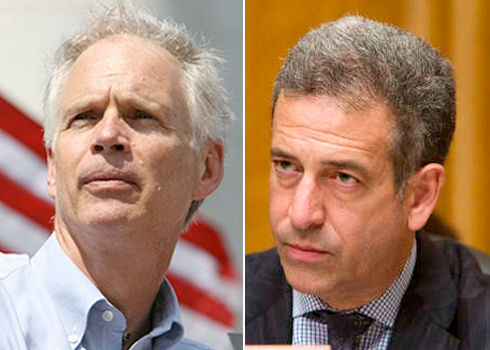Sen. Ron Johnson (R-WI), who defeated longtime campaign finance crusader Sen. Russ Feingold (D-WI) last year, has been under the microscope in recent days for possibly violating laws against corporate underwriting of campaigns.
Last week the Milwaukee Journal-Sentinel started asking uncomfortable questions about $10 million in deferred compensation Johnson received from his former company, Pacur, weeks after his $9 million self-financed successful 2010 campaign came to an end.
Johnson, a freshman Tea Party favorite, disclosed the $10 million windfall in his recently filed personal financial disclosure, available here.
When asked about why the $10 million payment was so close to the $9 million figure Johnson spent on the campaign, Johnson got a bit testy.
“You take a look in terms of what would be a reasonable compensation package, OK?” Johnson told the Journal-Sentinel last week. “It’s a private business. I’ve complied with all the disclosure laws, and I don’t have to explain it any further to someone like you.”
So far Johnson has not produced a written deferred compensation agreement that was signed and dated before he launched his campaign. Absent such an agreement, Johnson could face serious charges that he violated campaign-finance laws barring direct corporate funding of federal candidates, election law experts tell TPM.
Arent Fox’s Brett Kappel, an election law attorney, said evidence of a written agreement before Johnson ran for the Senate is critical to prove he did not rely on corporate funds for his campaign.
“It depends on whose money it was,” Kappel told TPM. “If there was a deferred compensation agreement before he ran for office, that would be a legitimate corporate payment [to him personally]. If there was no deferred compensation agreement at all, and the company is paying for his campaign, that would be a problem.”
The Supreme Court’s Citizens United ruling enables companies to spend unlimited funds on independent campaign expenditures benefiting candidates, but companies still cannot give directly from their corporate treasuries to federal candidates’ campaigns.
If Pacur were a publicly traded company, Johnson would have had to recuse himself from all discussions involving his compensation, deferred or otherwise. But because Pacur is a private company, the Federal Election Commission could target him personally.
“If he’s the officer…he would have personal liability [for cutting the checks to his campaign from the corporate coffers],” Kappel added. “The FEC has historically gone after the officers of the company in these cases. He would be liable not as a candidate, but as a former corporate officer.”
After his election to the Senate, Johnson handed over control of the company to his brother.
Johnson spokeswoman Mary Vought did not return several inquiries from TPM Monday.
Even though watchdogs are raising serious red flags over Johnson’s deferred compensation, they’re not counting on the FEC, a broken agency that either deadlocks over critical and controversial decisions or fails to take up cases at all.
“Given their lack of willingness to really enforce the laws, I won’t hold my breath on this one,” the Campaign Legal Center’s Meredith McGehee told TPM.
The deferred compensation is only the tip of the iceberg, according to campaign finance experts. A review by TPM of Johnson’s 2009 financial-disclosure form, also shows two promissory notes Johnson received from the same plastics company, Pacur LLC, in 2004 and 2007 for $1 to $5 million each with a very low 0.69 percent interest rate — virtually interest free.
Local Wisconsin bloggers have said the loans were part of an elaborate tax-avoidance plan.
Watchdogs tell TPM the loans could provide an interesting wrinkle in the case because federal candidates are barred from taking out loans at below market-rates as a way to finance any part of their campaign. The promissory notes were taken out long before Johnson ran for the Senate, so it’s not certain that any of the loan proceeds were used in connection with his campaign, but ethics experts say the loans should be investigated as part of the overall case.
“Under [Federal Election Campaign Act] anyone who gives themselves a loan out of their own personal business, the rates have to be at market or publicly available rates,” said Public Citizen’s Craig Holman. “If the rates are lower than what would be publicly available, then it is a corporation subsidizing a campaign.”









